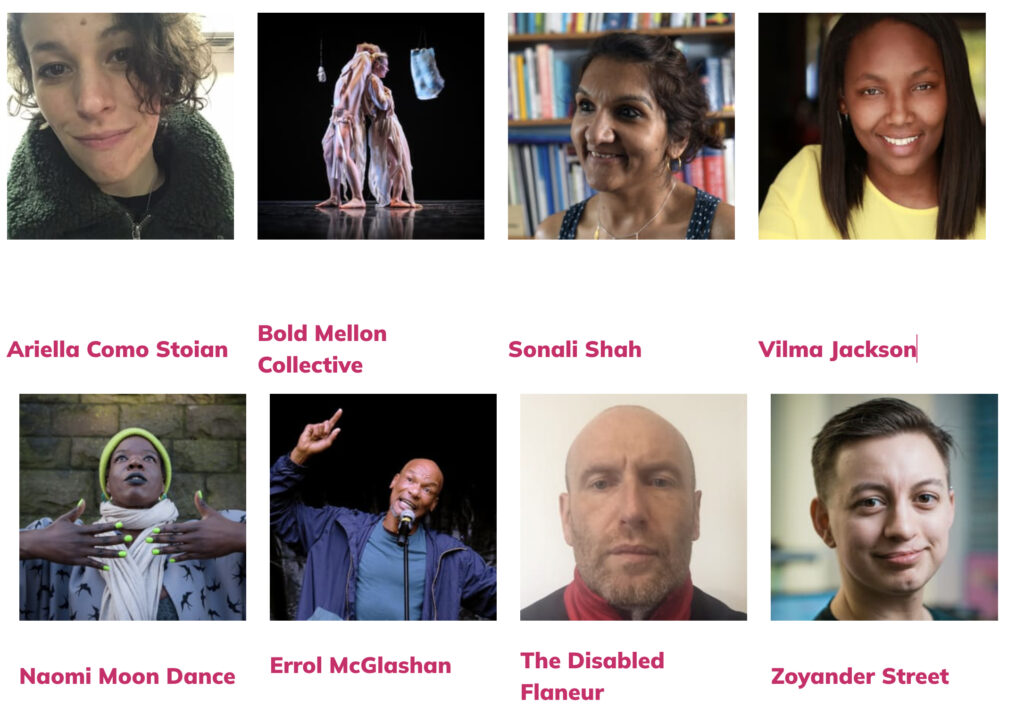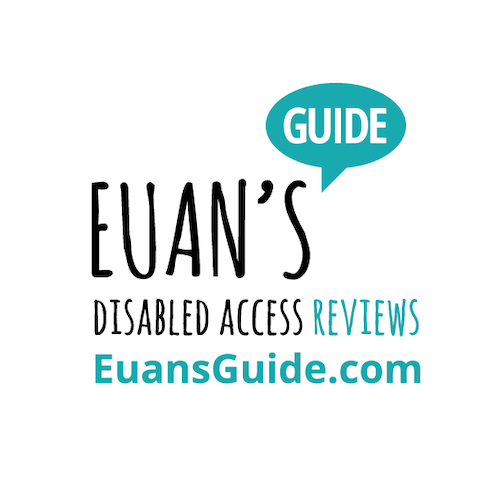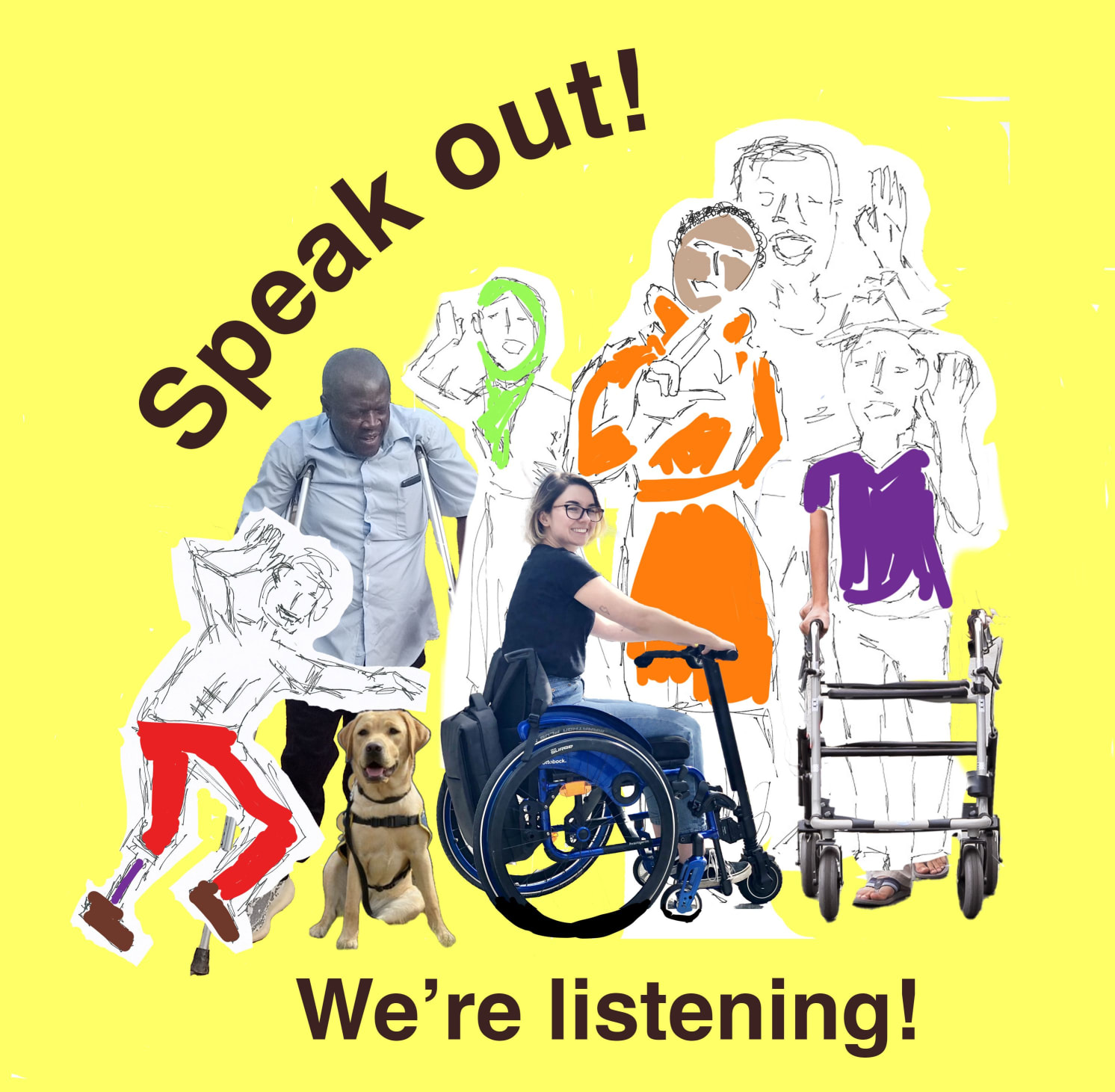My role is much more listening / influencing than ‘doing specific things’.
But here are some of my specific festival outputs.
After my comments initiated the festival, my first input as a curator was to say:
We must start as we mean to go along – by listening to and hearing the diverse voices of disabled people.
This means that Intersectionality is a key issue – and certainly not just to be tagged on as an afterthought.
The image above is what I created for the initial call-out: showing people with multiple disabilities, with a range of ages, ethnicities and genders, dressed in pride rainbow clothes, BSL signing
‘Speak Out, We’re listening’.
There’s lots of detail on the Theatre Deli website.
Below are some of my selected specific outputs – in reverse chronology.
———————————————————————————————–
8 Nov: Sheffield festival: I opened the festival with a discussion session.
August-October: Inviting / leading radical thinkers for 6 Deli Social Model Starters Podcasts:
— Ashokkumar Mistry on intersectionality
— Jan Grue on stigma, grieving and invisible work
— Jodie Louise Russell on the dichotomy / split between disabled and nondisabled people and drawing parallels between how Disabled and Mad people are treated by society
— Fionnathan, a son and father social enterprise, who reject the cult of individuality and the idea that we must operate solo – knowing that the best way to support one another is in loving i
17 July: My idea for carbon auditing the festival – as a starter for carbon auditing all the Deli work – is under way!
July: Artists accepted for the November festival:

June: Partnership initiated with Euan’s Guide.
This Disabled Access Charity is run by and for disabled people. It started with audience reviews about audience access. What we’re adding here is encouraging creatives to also review venues: is the stage accessible, are there any accessible backstage toilets .. and so on.
This is a really positive ongoing legacy for the festival.

Early May: reading and making decisions.
We received 80 submissions and cannot accept them all!
I argued for operationalising the best bits of the social model – and prioritising people/groups with links to the global south.
30 April: Submissions closed for theatre pieces for festival:
I am SO proud that we received 80 submissions!
And (like to!) believe this was linked to my/our inclusive listening approach.
Or maybe my initial ‘necessary but not sufficient’ comment – which initiated the festival.
March-April: supporting individuals / companies considering submitting
20 March: artist submissions open
March: designing submission process
February: Provocations:
I invited thinkers I thought would be great to offer provocations, to add to the initial responses.
Here’s my own provocation:
“We all need bread, but I – and maybe you – also need roses.
I – and maybe you – have to expend so very much of my life on even less than bread –
on those ‘activities of daily not-quite-living’ that so many others never have to think about
and certainly don’t get exhausted doing.
I – and maybe you – try not to think about how rarely I am noticed as human.
But I – and maybe you too – wont Ever Stop Insisting on Roses as well as bread.”
26 January: Sile Sibanda interviewed me about the Social Model Festival on BBC radio Sheffield
Listen here. (Jump to 41.40 to hear the interview).
January: We start getting great responses!
1 December 2022: Call out
Here are my words – to go with the image up at the top:
“Maybe you remember the medical model of disability – with doctors ‘fixing’ us? Or not fixing us! Maybe you felt excited about the social model – it’s the world that needs fixing! Maybe, though, the world hasn’t got fixed like you need it!
What’s key for you? Access for audiences? Access to creative work for creatives? Access to life? Social attitudes? Or something else?
And what do you think the answer might be? What might help?
Medical model? Social model? Something more? Something different? Do we just need some little tweaks? Or a third way? A fourth way?“
Speak Out!
Whatever you think and however you feel, we’d love to hear from you. We will use your responses to help plan the direction of the festival, and demonstrate the range of experiences and opinions you have.
And thats what we’ve done!
